
There is a widespread perception of old people having distinctive smells, expressed by less tactful children as, “grandpa smells funny”. Researchers decided to test if the scent was an intrinsic part of growing older, a product of the environment, or a trick of the mind.
Although they found the smell is mostly an effect of changing chemicals produced by our body, and identified the molecules involved, it also seems the brain of the one doing the smelling puts a twist in the tale.
In 2001, a team of researchers led by Dr Shinichiro Haze of the Product Development Center, Yokohama, had subjects aged 26-75 wear shirts designed to catch their body odors for three nights. Molecules clinging to shirt patches were extracted and run through a mass spectrometer to separate out the compounds for analysis.
The authors found a complex mix of chemicals, but most of these were unaffected by age. The exception was 2-Nonenal, an aldehyde that was only found on shirts worn by people 40 years and older and rising with age thereafter.
The paper in the Journal of Investigative Dermatology reporting the work revealed we don’t sweat 2-Nonenal at any age. Instead, older people’s skins release omega-7 unsaturated fatty acids, which become 2-nonenal when degraded by exposure to the air. Lipid peroxides hasten the process.
Haze and co-authors reached their conclusion based on a sample of just 22 individuals, but the work appears to have stood the test of time, with no subsequent refutations.
A 2012 study in PLOS ONE led by Dr Susanna Mitro, then at the Monell Chemical Senses Center, found people could distinguish between the body odors of people over 75 and under 55, but not between those in their 20s and aged 45-55.
Nevertheless, Haze’s work indicates not all of us are destined to wear the scent of age. Average 2-Nonenal concentrations for those aged 40-70 was 2.6 parts per million. However, two subjects in their 60s and one over 70 produced so little 2-Nonenal that even the mass spectrometer could barely detect it – noses would have had no chance. This was half the over-60 sample in the study.
The monosaturated omega-7s also showed a clear increasing trend with age, but for about half the subjects over 40 the levels were barely higher than among younger participants, if at all.
Other animals such as mice and deer have also been found to smell different as they age.
Why skin excretes more of the chemicals that become 2-Nonenal as we age remains a mystery. Ultradarwinists, who attribute every biological phenomenon to natural or sexual selection, think there is some evolutionary advantage in signaling old age. Even they struggle to explain what it might be, however, particularly since humans rely more on our other senses and have plenty of other ways to send messages. The wide variation among Haze’s older subjects further undermines the search for an evolutionary explanation.
Alternatively, the omega-7 release may simply be a consequence of aging bodies, and the degraded product is a side effect. The body has enzymes that desaturate fats, and their abundance may change as we age for many reasons, possibly increasing omega-7 abundance.
“Old person smell” is usually assumed to be a bad thing, and Haze and co-authors describe 2-Nonenal as having; “An unpleasant greasy and grassy odor.” It’s the molecule that gives aged beer its “cardboard” taste, making it enemy number one for chemists seeking to make beer last longer.
However, smelling like grass doesn’t sound all that bad. Moreover, when Mitro had people smell odors collected from people of different ages, those collected from older donors were not rated as more unpleasant and were actually considered less intense than those of the young.
Mitro and co-authors speculate old person’s smell is only considered unpleasant in context. Societies with more reverence for age might regard it differently.
The papers can be found in the Journal of Investigative Dermatology and PLOS ONE.
An earlier version of this article was published in October 2022.
Source Link: The Science Behind The 'Elderly Scent' And Why It Doesn't Affect Everyone